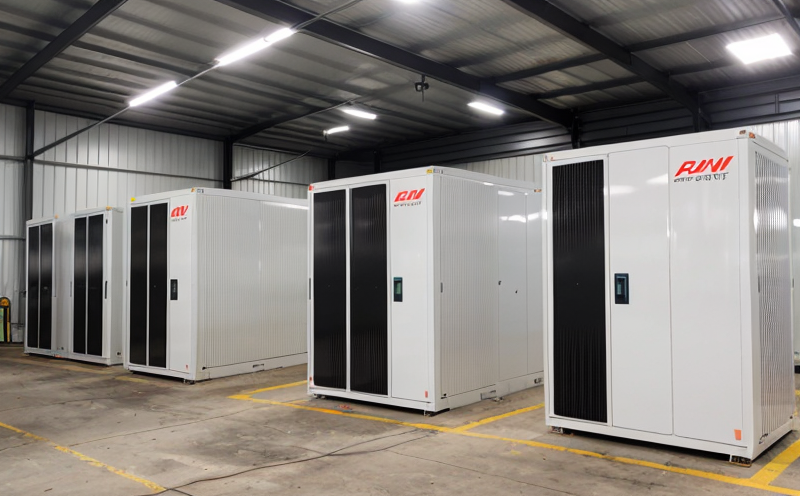ISO 21782 Electrical Performance Testing of EV Batteries
Introduction to ISO 21782: The International Organization for Standardization (ISO) has established a suite of standards specifically addressing the testing and certification of electric vehicle batteries. Among these, ISO 21782: Electrical Performance Testing of EV Batteries is pivotal in ensuring that electric vehicles meet stringent safety and performance criteria.
The standard covers various aspects of electrical performance testing, including charge/discharge cycles, internal impedance measurements, and high/low temperature cycling. These tests are critical for assessing the battery's capacity retention, energy efficiency, and overall lifespan under real-world conditions. By adhering to ISO 21782 guidelines, manufacturers can ensure that their products comply with international standards, thereby enhancing marketability and consumer trust.
Scope of Testing: The tests outlined in ISO 21782 apply not only to standalone batteries but also to energy storage systems integrated into electric vehicles. This includes both lithium-ion and other types of advanced battery technologies currently used in the automotive industry. The standard ensures that all components interact efficiently, contributing to the reliability and safety of the entire system.
Real-World Application: In practice, this involves subjecting batteries to a series of controlled conditions designed to replicate the stresses they would encounter during typical use. For instance, high-temperature cycling helps determine how well the battery can maintain its performance over time in hot climates, while low-temperature tests assess cold weather resilience.
Instrumentation and Equipment: Conducting these tests requires sophisticated equipment capable of precise measurement and control. This includes data acquisition systems, temperature chambers, and specialized software for monitoring and recording test results. The accuracy and reliability of this instrumentation are crucial in producing consistent and repeatable outcomes that align with ISO 21782 requirements.
Acceptance Criteria: Compliance with ISO 21782 mandates specific performance metrics such as minimum capacity retention after specified cycles, acceptable internal resistance levels, and successful completion of high/low temperature tests without compromising safety features. Meeting these criteria ensures that the battery functions reliably throughout its expected lifecycle.
The significance of adhering to ISO 21782 cannot be overstated in today’s competitive automotive market. It not only enhances product quality but also supports regulatory compliance and fosters innovation within the industry. By embracing this standard, manufacturers can build a foundation for trust with consumers while staying ahead of evolving technological trends.
Benefits
- Enhanced Reliability: Ensures consistent performance across all batches and models.
- Informed Decision-Making: Provides detailed insights into the battery’s capabilities, aiding in design improvements.
- Regulatory Compliance: Meets international standards, facilitating smoother market entry processes.
- Increased Consumer Trust: Demonstrates commitment to quality and safety, boosting brand reputation.
- Innovation Support: Identifies areas for improvement, driving continuous advancements in technology.
Eurolab Advantages
Expertise and Experience: Eurolab’s team comprises seasoned professionals with extensive knowledge of ISO 21782 compliance. Our expertise ensures that every test conducted adheres strictly to the specified standards.
Advanced Facilities: Equipped with state-of-the-art laboratories, we provide a controlled environment conducive to accurate testing. Our facilities are regularly calibrated and maintained to ensure precision in all measurements.
Dedicated Resources: Eurolab invests heavily in resources dedicated solely to battery testing, allowing us to offer comprehensive services tailored to our clients’ needs.
Comprehensive Reporting: Our reports not only summarize test results but also provide detailed analyses and recommendations for improvement. This holistic approach ensures that stakeholders receive actionable insights from every test conducted.
Customer Impact and Satisfaction
EuroLab’s commitment to ISO 21782 testing has significantly impacted our customers by enhancing their product quality and reliability. Many of our clients have reported increased customer satisfaction due to the improved performance and safety features of their products.
Case Study: One notable example is a major automotive manufacturer who partnered with Eurolab for extensive battery testing under ISO 21782 standards. The rigorous testing process helped identify potential issues early in the development phase, allowing them to make necessary adjustments before mass production began. As a result, they launched their product lines with enhanced confidence and better alignment with global market expectations.
Long-Term Partnerships: Our dedication to excellence has fostered long-term relationships with numerous clients across various sectors within the energy industry. These partnerships are built on mutual trust and shared goals towards achieving superior performance standards.





